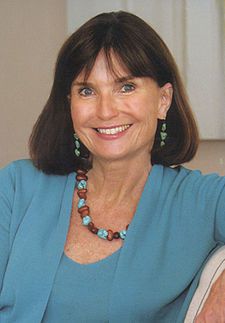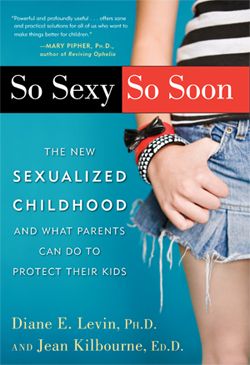 Advertising isn’t just annoying, contends industry critic Jean Kilbourne, it can be genuinely harmful, especially in promoting additions to alcohol, tobacco or even just shopping.
Advertising isn’t just annoying, contends industry critic Jean Kilbourne, it can be genuinely harmful, especially in promoting additions to alcohol, tobacco or even just shopping.
Kilbourne observe that many of the most prolific advertisers are trying to promote regular consumption of their products, which although legal, are nonetheless highly addictive. So they are, essentially, working to promulgate addictions.
Politics is another area in which Kilbourne worried that the growing reliance on campaign advertising is inflicting powerful and distorting influence, implicitly facilitating corruption of candidates while discouraging public participation in the electoral process.
 Those concerns have been exacerbated by the recent Supreme Court decision affirming “corporate personhood,” and striking down any limits on campaign spending by corporations. Kilboure fears that decision will have far-reaching and terribly destructive consequences.
Those concerns have been exacerbated by the recent Supreme Court decision affirming “corporate personhood,” and striking down any limits on campaign spending by corporations. Kilboure fears that decision will have far-reaching and terribly destructive consequences.
Jean Kilbourne will deliver her presentation, “Deadly Persuasion” about advertising and how it tries to manipulate us, in the Sonoma State University Cooperage, Tuesday, March 23 at 7:30 pm. Here's a summary/preview:
What are advertisers really selling us?

Advertising is an over $200 billion a year industry. We are each exposed to over 3000 ads a day. Yet, remarkably, most of us believe we are not influenced by advertising. Ads sell a great deal more than products. They sell values, images, and concepts of success and worth, love and sexuality, popularity and normalcy. They tell us who we are and who we should be. Sometimes they sell addictions.
In her slide presentations, Jean Kilbourne examines images in advertising with the incisive wit and irony that have delighted and enlightened her audiences for years. With expert knowledge, insight, humor and commitment, she brings her audiences to see that, although ads may seem harmless and silly, they add up to a powerful form of cultural conditioning. She is known for her ability to present provocative topics in a way that unites rather than divides, that encourages dialogue, and that moves and empowers people to take action in their own and in society’s interest.
She explores the relationship of media images to actual problems in the society, such as violence, the sexual abuse of children, rape and sexual harassment, pornography and censorship, teenage pregnancy, addiction, and eating disorders. She also educates her audiences about the primary purpose of the mass media, which is to deliver audiences to advertisers. The emphasis is on health and freedom — freedom from rigid sex roles, freedom from addiction, freedom from denial, and freedom from manipulation and censorship.
 There were no real “bad guys” loose on the Santa Rosa Junior College campus yesterday, but five dozen real police officers were there to train in tracking and capturing some simulated shooters.
There were no real “bad guys” loose on the Santa Rosa Junior College campus yesterday, but five dozen real police officers were there to train in tracking and capturing some simulated shooters.

The SWAT (Special Weapons and Tactics) team training exercises took place behind yellow police taped barriers, well out of sight of any members of the public and even the few reporters allowed in. But Santa Rosa Police Sgt. Mike Tosti says the citiznery will benefit from what they could not see.
 SRJC Police Cadet Corrine Linder, who volunteers to be part of the emergency response scenarios, said she felt her regular training and experience had equipped her well for the day’s exercises.
SRJC Police Cadet Corrine Linder, who volunteers to be part of the emergency response scenarios, said she felt her regular training and experience had equipped her well for the day’s exercises.
Click here to see photographs from the training exercise taken by the Press Democrat's Jeff Kan Lee.

With the US deeply engaged in two active wars in the Middle East, it’s past time for peace activists to revive their opposition, says Visiting Nobel Peace Prize nominee Kathy Kelly.

There are lessons to be learned from the war in Iraq, agrees Peace activist Kathy Kelly, a coordinator for Voices for Creative Nonviolence, but the purported success of so-called “Surge” is not one of them.
War begets secrecy at the highest levels of government, which distances national leaders from the citizenry, Kelly cautions. She’d like to hear the Obama administration clearly and publicly spell out the reasons for our military presence in Afghanistan, but suspects the real rationales are too murky and complex to meet any tests for transparency.
Kathy Kelly will report on her recent visit to Afghanistan in Santa Rosa tomorrow evening at 7 pm at Christ Church United Methodist, 1717 Yulupa Avenue. Her presentation, co-sponsored by the peace and Justice Center, Sonoma County, is titled, "The Cost and Sorrows of War: Pakistan, Gaza,Iraq, Afghanistan." Information: (707) 575-8902.

One little-reported consequence of the war in Iraq has been the displacement of an estimated 2 million former citizens who have fled to neighboring nations or even further. Their story is the subject of Eclipse of the Sunnis, a new book by NPR Mideast correspondent Deborah Amos.
Amos began covering the Middle East for NPR more than 20 years ago, and renewed her interest in the region following the 9/11 attacks. Even though she sees the Iraqi Sunnis as complicit in their own downfall, as instigators of the sectarian insurgency, she also believes their situation as an enormous population of displaced professional and middle class families is an important story, one she felt could best be told by presenting the human faces of some of those involved.

The split between Sunni and Shiite Muslims may appear to be the result of religious differences between two factions within Islam, but Deborah Amos cautions that this interpretation is a simplistic misreading of the complex geopolitics of the Middle East.
 It’s a convenient shorthand to speak of the displaced Iraqis as “refugees,” but that, too, is an over implication, in Amos’s view. Because these are mostly middle class households, they are able to monitor events and their situation in ways that are completely unknown to most poverty-stricken refugees. But their circumstances leave them vulnerable to an eroding standard of living that may take generations to recover.
It’s a convenient shorthand to speak of the displaced Iraqis as “refugees,” but that, too, is an over implication, in Amos’s view. Because these are mostly middle class households, they are able to monitor events and their situation in ways that are completely unknown to most poverty-stricken refugees. But their circumstances leave them vulnerable to an eroding standard of living that may take generations to recover.
Amos writes about the significance of the Iraqi general election here.

Rachel Carson may have been America’s first environmental whistle-blower. That’s inspired for a west county poet to create her own biographical one-woman show about the author of Silent Spring.

Lilith Rogers describes herself as a lifelong gardener and poet—she’s even written a book of her own about horticulture in western Sonoma County—but she got the spark of an idea about doing something new when she saw a one-woman show about Alberta King, the mother of Martin Luther King, at Santa Rosa Junior College. So Rogers began casting about for a subject that she might take on for a similar presentation.
 One reason that Silent Spring had such an immediate and widespread impact when it was published, explains Lilith Rogers, was that the book offered a clear and well-documented explanation that linked a number of troubling events that were readily observable in the American environment.
One reason that Silent Spring had such an immediate and widespread impact when it was published, explains Lilith Rogers, was that the book offered a clear and well-documented explanation that linked a number of troubling events that were readily observable in the American environment.
Rachel Carson and Silent Spring were a media sensation, too, by the standards of 1962. Rogers says the flavor of that fascination, and the some of the now-discredited attitudes that were prevalent then, could be seen in an exchange that was broadcast on national television on the prominent CBS Reports program.
 Doing the one-woman show offers a way for Carsons’ voice to be heard again today, as in this excerpt from Rachel Carson Returns in which Rogers reads from the final chapter of Silent Spring.
Doing the one-woman show offers a way for Carsons’ voice to be heard again today, as in this excerpt from Rachel Carson Returns in which Rogers reads from the final chapter of Silent Spring.


 Live Radio
Live Radio
